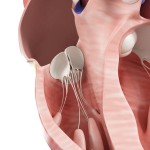Roughly five million Americans are diagnosed annually with heart valve disease. This condition can disrupt the proper flow of blood and cause the organ to become dangerously weak.
When the decision is made to have surgery, patients are offered a choice: mechanical or bioprosthetic valve replacement. A recent study from the Karolinska Institute in Sweden indicates that in relatively young patients mechanical heart valves are associated with better survival rates than those who receive biological valves.
The Swedish study published in the European Heart Journal examined 4,500 Swedish patients between 50 and 69-years old who underwent aortic valve replacement.
We show that patients who received a mechanical prosthesis had better survival rates than those who had received a biological prosthesis, according to Ulrik Sartipy, MD, associate professor at the Department of Molecular Medicine and Surgery at Karolinska Institute. Our results are important since the trend in Sweden and abroad in recent years has been towards a greater use of biological valve prosthesis in relatively young patients, which has no backing in clinical therapy guidelines.
This study validates findings from previous studies that had indicated a potential survival benefit in younger patients requiring valve replacement, and certainly shifts the balance more in favor of mechanical heart valves.
Biological valve prostheses have been used more and more in young patients in recent years, partly because these patients don t have to take blood thinners," added Natalie Glaser, MD, PhD candidate at the Karolinska Institute s Department of Molecular Medicine and Surgery. "Our research shows that mechanical valve prostheses should be the preferred option for young patients.
There are several different causes for heart valve disease. It can be congenital, or acquired as a result of infection as in the cases of rheumatic fever or endocarditis (where the bacteria preferentially attacks the valves). There can be structural damage to the valves over time, where the valve's leaflets become stretched, or the muscles they are attached to are torn.
The heart has four valves, but two are most-frequently operated on the mitral and the aortic. The aortic valve is the one that is most likely to be replaced because it cannot be repaired, whereas the mitral valve can.
The choice of replacement valve is up to the clinician and patient. The mechanical valve is much more durable than the bioprosthetic (human tissue, porcine, bovine, or equine), which requires higher rates of re-operation because of structural valve damage over time.
There are several key considerations when choosing valve type:
- Durability mechanical valves last longer (expectations are for lifelong use)
- Age patient s age is inversely related to durability of bioprosthetic valve; patient s life span is factored in
- Predilection for clots mechanical valves require life-long use of blood thinners; bioprosthetic valve requires blood thinners for only three months after surgery
- Survival rates younger patients tend to survive longer with mechanical valves and older patients (> 65) can opt for either




